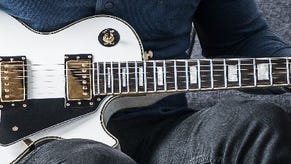Does Rocksmith 2014 Really Work? PS3 Review
Two guitar newbies spent three weeks with Rocksmith 2014 to find out just how good of a learning tool it really is.
This article first appeared on USgamer, a partner publication of VG247. Some content, such as this article, has been migrated to VG247 for posterity after USgamer's closure - but it has not been edited or further vetted by the VG247 team.
To give this review some context: when I started, I had absolutely no guitar-playing experience whatsoever. Which is why I thought I'd be the perfect candidate to test it out.
Adding additional perspective is V-Dub, an experienced musician who can play cello, bass and piano. She doesn't know how to play guitar, but has always been interested in learning. I thought the contrast between non-musician-gamer and a musician-gamer might make for some interesting reading.
We played most nights for around 15 mins to an hour, and wrote up our thoughts at the end of each week. We've also provided a conclusion based on our experiences.
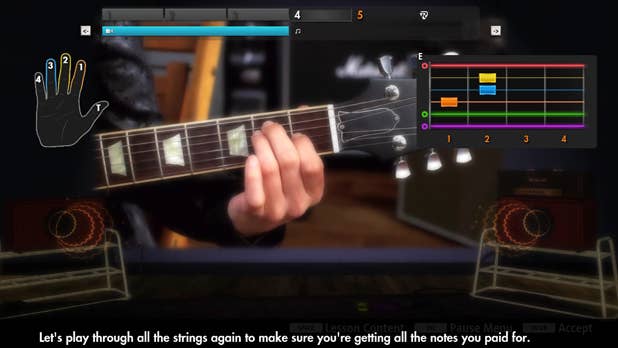
Week One
Jaz: Setting everything up was surprisingly easy. Indeed, getting Rocksmith 2014 up and running was no worse than putting together a typical Rock Band or Guitar Hero setup. Plug in your guitar, run the audio through its own discrete channel to ensure no lag, and that's pretty much it.
In terms of the music selection, there are just over 50 tunes to choose from initially, and well over 100 additional ones to download should you want more. The selection runs the full rock spectrum and spans five decades, which means there's plenty of variety in both the style and the complexity of the songs. Adding even more variety are options to play either lead or rhythm sections, and even bass, should that be your thing.
Jumping straight into the game, my immediate reaction was one of confusion. I had absolutely no idea what I was doing, and fortunately it didn't take Rocksmith very long to realize that. Whereupon it very obligingly dumbed itself down to its lowest difficult setting. If it was a human, I'm sure it'd be shaking its head and rolling its eyes. But fortunately it's not, and instead it made some helpful suggestions about what I should do next. Which was, as you might expect, to start at square one with the first of the ultra-newbie lessons.
So that's where I started, and slowly but surely began to learn the basics. And when I say basics, I really do mean the basics. Like how to hold a pick, where to place my hands on the guitar, and even how to put it around my neck. If you're a more advanced player, you can skip all this and go straight to the hard stuff. But for me, this newbie instructional content was a Godsend. It helped me get my head around the very concept of playing a guitar, and build up some confidence. What I particularly like is that with many lessons, Rocksmith gives you feedback as you play that's as helpful as it is sometimes embarrassingly obvious – like having my hand completely in the wrong place and holding the wrong strings. But that's great, because it does actually teach you, and it never gets frustrated if you keep making the same mistakes over and over. You just keep practicing, it keeps telling you what you're doing wrong, and eventually you get it. And yes, I really am that bad.
After playing for a few days, the beginner lessons got me to the point where I was really ready to start to learn. That might sound slow, but let me stress that when I started, I couldn't even hold a guitar properly. Now I can, and I'm beginning to understand how to play notes and chords. I still can't play a song, but weirdly, I'm finding it fairly easy to play some of the Guitarcade games. I think because I'm a gamer, it's simply easier for me to relate finger positioning and strumming as a bizarre kind of controller. But it's good practice, and is basically teaching me the kind of finger positioning memory I need to have to be able to play notes consistently.
So for now I'm going to stick at this and concentrate on the basic lessons and see how well I do.
V-Dub: It took me a few days to get used to the way the game turns tablature into a strange Rock Band hybrid. I didn't find it immediately intuitive, and had to work to learn the system. It's almost like learning notes again, but what you see is what you do: it's very clear once you understand the way it works and can "read" the instructions without having to "translate" them into finger positioning. It just takes some practice to get to that point. Because of that, most of my early sessions felt more like I was learning how to use Rocksmith's teaching process, rather than learning the guitar.
However, when reading Rocksmith's instructional format became second nature, I started hitting the right notes. I must have been doing something right, because the game began to throw more and more notes at me until I felt I was really playing the tune, rather than selected notes from it. This felt very rewarding, and made me feel I was making quite rapid progress after my fairly slow start.
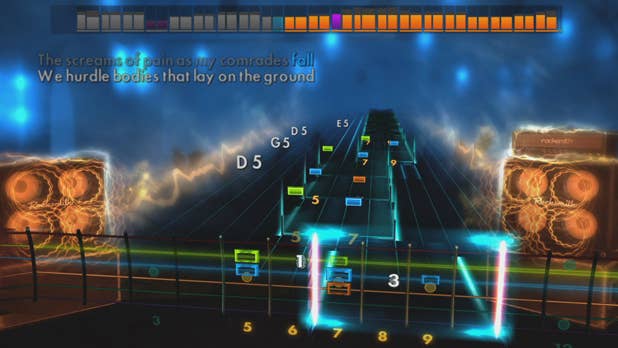
Week Two
Jaz: This week I was shocked to find that, after a fair bit of practice, I could almost play along to the most basic version of "You Really Got Me." I still have a long, long, looooong way to go, but it's encouraging to see that I am making some kind of progress, even though it's not a huge step. What's clear is that I need to practice a lot more, which is something I'm sort of struggling with. When I started Rocksmith, I liked the idea of learning to play the guitar, but it's not like I really had a deep-down desire to do so. And because of that, sometimes it feels like work (which it is, because I'm reviewing the game). But my greater point is that this isn't easy. I mean, I can see how Rocksmith 2014 makes learning guitar easier, but that doesn't mean it IS easy. It just makes learning something that's hard, easier, if that makes any kind of sense at all.
V-Dub: Sometimes I feel like I'm playing a sophisticated version of Rock Band, especially when I'm playing a song repeatedly, and Rocksmith is showing me how I am improving by giving me a score. This makes practice repetition more fun, and I feel encouraged to have another go to see if I can do better. This is an excellent aspect of the game. If I was just playing the same thing over and over without that feedback, it would eventually feel like a chore. But having this extra performance data really motivates me, and makes one of the more tedious parts of learning an instrument – the repetition – more fun than it should be.
Now I'm familiar with Rocksmith's visual presentation, I can switch from song to song fairly easily and learn it quite quickly, especially since the game adjusts itself if I'm not quite getting it right. I also like being able to practice parts of a song until I get it right. The different options that enable me to focus on specific parts of a song, or practice techniques in a lesson are very useful. It lets me learn what I want when I want, and focus on the areas where I feel I need more practice rather than having to follow a set course.
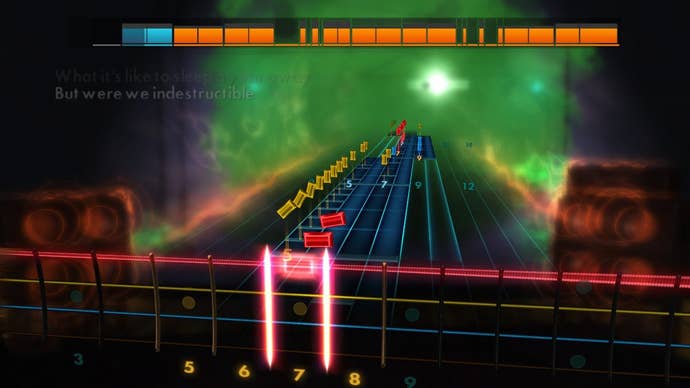
Week Three
Jaz: I was hoping that by now I'd have reached a tipping point where the amount of effort I was putting into learning techniques would be reflected by the amount of progress I was making in terms of learning songs. But the reality is, I'm still struggling through some of the basics.
That's not to say Rocksmith isn't working. Indeed, far from it. It's working very well – because what it's doing is sticking with me, and helping me continually repeat the things I need to learn until I finally get them right. I'm just frustrated to be learning this slowly, especially with V-Dub already able to play bits of songs without even looking at the damn screen. But then, that's why she's also part of this review. To see how two people of almost diametrically opposed musical talents get on with playing the same thing. In V-Dub's case, she's learning very quickly. In my case, it's at a snail's pace. But what that tells us is Rocksmith is very well designed in terms of the sheer spectrum of abilities it can cater too – and that's very impressive.
V-Dub: This week, I feel I'm making significant progress. I know how the system works, and the non-linear learning structure is letting me pick and choose what to work on next. This is keeping things interesting and fresh: sometimes I'll pick a new tune and play it and in doing so learn a few new things. And sometimes I want to try a specific technique, and once I've learned it, apply it to a new tune.
I've been hearing Jaz complain about not making progress and not being cut out to be a guitar player. He's frustrated because he thinks he should be learning to play the guitar as fast as he usually learns to play a game, which isn't a realistic expectation. Learning an instrument is not to be taken lightly, and it requires work, dedication and plenty of practice. There's no substitute for that, and no shortcuts. Even though Rocksmith makes learning easier and fun, you still have to put in the time. It's important to remember that you will eventually learn - it just might take longer and require more practice than you might have first anticipated.
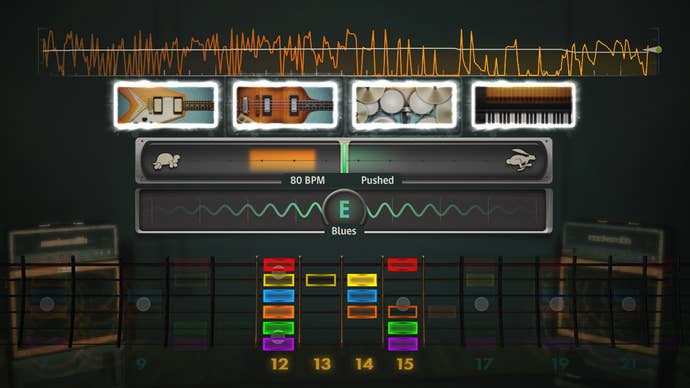
Conclusion (25 days later)
Jaz: After working with it for three weeks, I can tell you that Rocksmith 2014 really can teach you how to play guitar. Coming in, I knew absolutely nothing – and now I know most of the basics. In many respects, it's much better than a human teacher, because you don't have to pay by the hour, it's infinitely patient and its lessons are infinitely repeatable. That means whether you're a slow learner, or some kind of gifted guitar maestro, Rocksmith 2014 will help you learn to play, whether it takes days or weeks or months.
It seems I'm a fairly slow learner, and it took me much longer to pick up the basics than I hoped. But looking back over the past three weeks, what I can tell you is that I have actually come a long way, even if I don't necessarily feel it. I was hoping that by now I'd be playing songs competently. I'm not: I'm still bumbling along. But you know what, bumbling along really isn't bad considering that three weeks ago, I didn't even know how to hold a pick. So maybe I shouldn't be so hard on myself. I mightn't be as good as I'd like to be, but what I do know is that if I stick at it, I know I will eventually get there – even if it takes another three or so weeks.
And therein lies the crux of this review.
Rocksmith 2014 does help you learn the guitar, and it does so at your own pace. It doesn't necessarily make it easy - it isn't like Rock Band where you can pick up your faux guitar and very quickly feel like you're banging out tunes. This is the real thing, and it's complex and challenging. As I've learned over the last few days (and thanks to a bit of coaching from my co-reviewer), practice makes perfect. In that sense, what you put into Rocksmith, you get out of it. If you're expecting to become a guitar god within a few hours, you're going to walk away disappointed. But if you're genuinely interested in learning guitar and are prepared to put in the time, this will teach you how to play - and you'll have fun while you learn.
V-Dub: I am very impressed with the way Rocksmith 2014 works. It took a few days of getting used to, but once I got comfortable and familiar with its teaching system, I made progress quite rapidly. I was initially concerned that I wasn't really going to be learning to play a guitar, but instead was just going to be taught how to play specific songs by repeating patterns. But I needn't have worried. While playing songs is a big part of the learning process, Rocksmith 2014 also lets you work on techniques and take your skills way beyond just repeating the chords of a great tune. So in that sense it's a genuine learning tool that helps you develop your skills, as well as teaching you chords and notes that you can then improvise with and start making your own music.
The best part of Rocksmith is the Session Mode, which I've just started to play with. The AI musicians respond quite well to what you're doing, and even if you're just playing basic riffs, can make you feel like some kind of virtuoso. That is definitely a really good thing, as it helps build up your confidence and gives you the freedom to try out new things, and even make a horrible mess of a noise without having to worry about annoying fellow human players.
As it is with learning any instrument, you need patience and perseverance to become an accomplished player. Rocksmith 2014 won't make you a great guitarist if you're not prepared to put in some effort, but if you have the desire and are willing to invest the time, it really will make a guitarist out of you.
Addition (Oct 27th): Why didn't this get 5 stars?
A question that was asked by Charlesphelps35 was why we didn't we award Rocksmith 2014 5 stars? I answered him in the comments thread, but thought I'd include my response here, just in case anyone else was wondering the same thing. Ultimately, the score was a long and interesting debate between V-Dub and I. I was thinking five stars, because I liked the way Rocksmith helped me learn all the basics. But V-Dub thought that the way the game presents notes makes the initial learning process a little challenging because it's not that intuitive. That's something I eventually noticed when I reached the point where I was trying to play songs.
So in the end I agreed with her to knock off the half star. Rocksmith is a truly great learning tool, but there is still a little room for improvement. V-Dub feels that if Ubisoft added options like learning from a tab-based system, or perhaps the ability to select a different format for the song learning process (tabs falling down the screen, for example, rather than playing the game like Rock Band) that would enable the player to pick a presentation style that might be more natural and intuitive for them, thus making Rocksmith a little easier to use. Perhaps such a feature might be added to the next edition - and that could well elevate it to 5 stars.
Addition (Dec 9th 2013): In-depth multiplayer mode review
Since writing this review, V-Dub and I have spent a lot of time playing Rocksmith's multiplayer mode. It's something we didn't talk about much in the review, so we thought we'd write a feature about it - because it's really good!
ConclusionRocksmith 2014 is a very impressive guitar learning experience. Its comprehensive suite of lessons and practice formats, fun mini-games and hugely entertaining Session Mode make it suitable for anyone, from novices who've never picked up a guitar to competent players looking to improve their technique.
Rocksmith 2014 Edition
PlayStation 4 & Xbox One
Release date: November 4, 2014
How many songs are included with Rocksmith 2014? The game has the same original 55 songs as the PS3 and Xbox 360 versions, but also includes 10 more songs that you can unlock by achieving goals.
Are DLC songs transferrable? Yes, but only PS3- PS4 and Xbox 360 - Xbox One. However, the additinal good news is that if you bought the Import Pack for the original game, you'll also be able to port those (but again with the same console to console restrictions.
Can I buy original Rocksmith songs? Yes.
Do I need to buy a Rocksmith Real Tone Cable? If you don't have one, then yes. If you have a cable from an older copy of the game, that will work with the PS4 and Xbox One versions, which'll save you $20.
So what's actually new>? The game is largely the same as last year's version. However, the game has had a graphical upgrade, so everything is in 1080p. The PS4 version also supports remote play.
We're expecting to get Rocksmith 2014 in a few weeks, and will do a similar multi-week review to what we did last year.
ConclusionRocksmith 2014 is a very impressive guitar learning experience. Its comprehensive suite of lessons and practice formats, fun mini-games and hugely entertaining Session Mode make it suitable for anyone, from novices who've never picked up a guitar to competent players looking to improve their technique.

